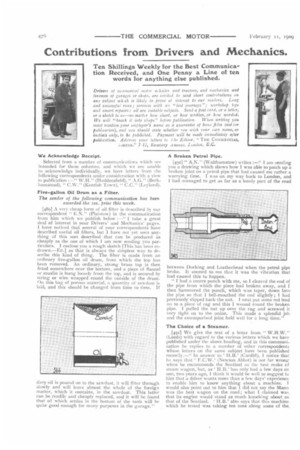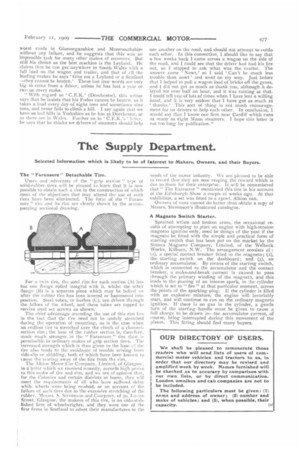THE COMMERCIAL MOTOR
Page 20

Page 21

If you've noticed an error in this article please click here to report it so we can fix it.
Contributions from Drivers and Mechanics.
Ten Shillings Weekly for the Best Communication Received, and One Penny a Line of ten words for anything else published.
Drivers of commercial for viticles and tractors, and mechanics and foremen of garages or shops, are invited to send short contrthutions on
any subject wh.ch is likely to prove of interest to our readers. Long and successful rails; services with nu 4' lost journeys" ; workshop tips and smart repairs: all are suitable subjects. Send a post card, ur a letter, or a sketch to us—no maitohow short, or how written, or how worded. We wilt "knock it into shape" before publication. When writing you must mention your employer's name as a guarantee of bona fides (not for polxwion), and you should stale whether you wish l'Oif Y own name, or initials only, to be published. Payment will be made immediately alter pubItcafion. Address your letters to I he Editor, " THE COMMERCIAL .N..oro.k." 715, RoseOery Avenue, London. E.G.
We Acknowledge Receipt.
Selected from a number of communications which are intended for these columns, and which we are unable to acknowledge individually, we have letters from the following correspondents under consideration with a view
to publication W.H." (Huddersfield), " A.G." (Berkhamstead), " C.V." (Kentish Town), " C.C." (Leyland).
Five-gallon Oil Drum as a Filter.
The sender of the following communication has been awarded the los. prize this week.
[489] A very cheap form of oil filter is described 1-13 our correspondent " EN." (Plaistow) in the communication from him which we publish below :—" I take a great deal of interest in your Drivers' and Mechanics' pages. I have noticed that several of your correspondents have described useful oil alters, but I have not yet seen anything of this sort described that can be produced as cheaply as the one of which I am now sending you particulars. I enclose you a rough sketch This has been redrawn.—Eni as that is always the simplest way to describe this kind of thing. • The filter is made from an ordinary five-gallon oil drum, from which the top has been removed. An ordinary, strong brass tap is then fitted somewhere near the bottom, and a piece of flannel or muslin is hung loosely from the top, and is secured by string or wire wrapped round the outside of the drum. On this bag of porous material, a quantity of sawdust is laid, and this should be changed from time to time. If dirty oil is poured on to the sawdust, it will filter through slowly and will leave almost the whole of the foreign matter, which it contains, in the sawdust. This latter can be readily and cheaply replaced, and it will be found that oil 'which settles in the bottom of the tank will be quite good .enough for many purposes in the garage."
A Broken Petrol Pipe..
[490]" A.N." (Walthamstow) writes :—" I am sending you a drawing which shows how I was able to patch up a broken joint on a petrol pipe that had caused me rather a worrying time. I was on my way back to London, and I had managed to get as far as a lonely part of the road between Dorking and Leatherhead when the petrol pipe broke. It seemed to me that it was the vibration that had caused this to happen.
" I had a centre punch with me, so I cleared the end of the pipe front which the piece had broken away, and I then hammered the punch, which was taper, down into the pipe so that I bell-mouthed the end slightly ; I had previously slipped back the nut. I next put some red lead on to a piece of rag and this I wound round the broken pipe. I pulled the nut up over the rag and screwed it very tight on to the union. This made a splendid job and the extemporised joint held well for a long time."
The Choice of a Steamer.
1491] We give the text of a letter from " W.H.W." (Leeds) with regard to the various letters which we have published under the above heading, and in this communication he replies to a number of other correspondents whose letters on the same subject have been published recently.—" In answer to H.B.' (Cardiff), I notice that he says that F.C.W.' (Newton Abbot) is not far wrong when he recommends the Sentinel as the best make of steam wagon, but as H.B.' has only had a few days on one, two years ago, I think it would be well to suggest to him that a driver wants more than a few days' experience to enable him to know anything about a machine. I would also point out to him that I did not say the Mann was the hest wagon on the road; what I claimed was that its engine would stand as much knocking about as.
that of the Sentinel. HAL' also says that this machine, which he tested was taking ten tons along some of the.
worst roads in Glamorganshire and Monmouthshire without any failure, and he suggests that this was an impossible task for many other makes of steamers, But still his choice as the best machine is the Leyland. He claims that he can get anywhere in South Wales with a full load on the wagon and trailer, and that of r.11 the leading makes he says 'Give me a Leyland or a Sentinel —they cannot be beaten.' These last four words are very big to come from a driver, unless he has had a year or two on every make.
" With regard to C.E.X.' (Dorchester), this writer says that he insists that his Foden cannot be beaten, as it takes a load every day of eight tons and sometimes nine tons, and never fails to climb a hill. I say again that we have as bad hills in Yorkshire as he has at Dorchester, or as there are in Wales. Further on in C.E.K.'s ' letter, he says that he thinks we drivers of steamers should help one another on the road, and should not attempt to outdo each other. In this connection, I should like to say that a few weeks back I came across a wagon on the side of the road, and I could see that the driver had had his fire out, so I stopped to ask what was the matter. The answer came Nowt,' so I said Can't be much less trouble than nowt' and went on my way. Just before that I helped to pull a wagon load of bricks off the grass, and I did not get as much as thank you, although it delayed me over half an hour, and it was raining at that. I could tell you of lots of times when I have lent a willing hand, and it is very seldom that I have got as much as
thanks.' This sort of thing is not much encouragement for us drivers to help each other. In conclusion, I would say that I know one firm near Cardiff which runs as many as eight Mann steamci-s. I hope this letter is not too long for publication."






















